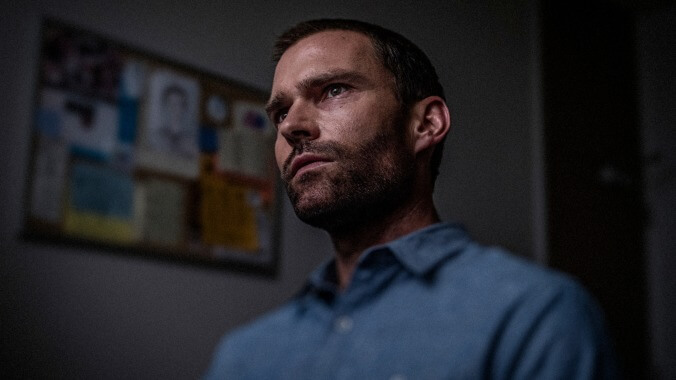Seann William Scott is a long way from Stifler in the psycho parenthood thriller Bloodline


Pregnancy as body horror is a familiar subgenre, but the new Blumhouse thriller Bloodline takes that idea a step further by presenting parenthood as a corruptively violent force, transforming a new mother or father from the inside out. The need to protect isn’t that far off from the need to destroy, and director Henry Jacobson’s gory thriller is initially quite effective when it complements the lies families tell each other with arcs of jugular blood.
Seann William Scott has been cast against type as Evan Cole, a seemingly normal high school counselor who wears corduroy blazers and lends out books to his students. He’s mostly well-liked, even nicknamed Mr. C by high school senior Chris (Raymond Alexander Cham Jr.), whom Evan has counseled for years. At home, it’s ostensibly a joyous time for Evan and his wife, Lauren (Mariela Garriga), who is pregnant with their first child. But when their son, Andrew, is born, the routines of parenthood almost immediately take a toll.
Lauren has trouble bonding with and breastfeeding Andrew, and she soon spirals into post-partum depression. The baby’s endless crying keeps Evan up, distracting him during his counseling sessions. And when his mother, Marie (a perfectly cast Dale Dickey), moves in to help care for her grandson, her presence drives a wedge between Evan and Lauren—and sparks memories in Evan of sharp knives and spurts of blood, and a desire to kill. “I will never hurt you, I will never judge you, and I will never leave you,” Evan tells his son. But is that a promise or a threat?
First-time director Jacobson and co-writers Avra Fox-Lerner and Will Honley start Bloodline with an homage to Psycho—a jarring shower murder, and of a blond woman, no less!—and then jump backwards to introduce Evan and Lauren. The script is sparse but deliberate, juxtaposing who Evan is with people he loves compared with those he’s hunting. The language he uses during counseling sessions gets a sinister spin when he repeats it during attacks (“Please describe to me the feelings and sensations you experience,” he says to a victim he’s already stabbed once), and Scott nails that duality, playing Evan as a tightly wound man mostly going through the motions of normalcy. There are no glimmers of Stifler in this performance: The actor deviates between flashing a bland smile and setting his jaw in a hard stare to show us the two sides of Evan. It’s not particularly creative, but it works for the character.
Absent Scott’s signature goofiness, Bloodline possesses a nasty sense of humor, derived primarily from the relationship between Evan and Marie. Cinematographer Isaac Bauman composes certain shots first with Evan and then recreates them with Marie to demonstrate their familial bond: mother and son positioned similarly in their home and in the hospital, displaying an innate similarity through body language. Split diopter shots emphasize the separation of Lauren from their mother-son relationship, though sometimes the film gets too literal in its Oedipal complex. (Who was asking for an open-mouthed kiss between Scott and Dickey?) Brisk editing by Nigel Galt (Eyes Wide Shut), accompanied by Trevor Gureckis’ synth-heavy, Cliff Martinez-like score, communicates the monotonous experience of parenting an infant: the glow of the baby monitor in the middle of the night, the sound of the sticky fasteners on diapers, the cacophony of screams.
But the film can’t quite decide how risky it wants to get, which feels like maybe it doesn’t trust its audience. Some elements are garishly over-the-top: Barely five minutes after meeting Lauren, we’re eye-level with her cleanly shaved vagina as she gives birth to a bloody, mucus-covered Andrew. In another scene, a character dressed like a ’70s porn stereotype speaks glowingly of statutory rape and incest. Such moments feel like Bloodline reveling in its R rating, particularly when it comes to Lauren and her nude body. Yet the film also steps back from villainizing Evan’s behavior, primarily setting up situations in which his murders are justified. Bloodline itself never wonders if Evan is a bad person, and the movie feels stifled by that lack of self-awareness.
When Bloodline sticks to Evan and Marie, its themes of family and responsibility are derivative but stylishly communicated, through a propulsive score, quick cuts, and artistic sprays of blood. A third-act turn that isn’t supported sufficiently by preceding character development derails the rhythm. The final 15 or so minutes force the film to grapple too generally with the question of what children inherit from their parents, shifting the story from an exploration of one man’s distorted idea of fatherhood into something broader. Before that, though, Bloodline gives its characters just enough interiority to probe at the idea that parenthood’s combination of “love and total panic at the same time,” as Lauren says, can push someone toward murderous madness.